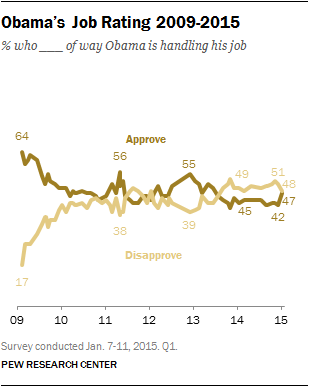
Shortly after Obama’s reelection in 2012, 55% approved of his job performance, while 39% disapproved. But his job rating became more negative than positive in the fall of 2013 – and remained in negative territory through the end of last year. Currently, about as many Americans approve (47%) of his overall job performance as disapprove (48%).
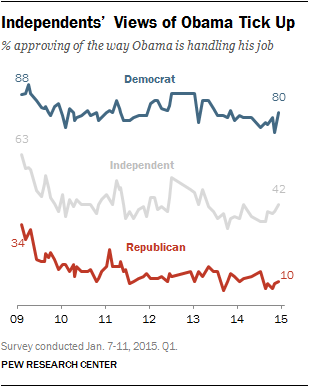
Over the last several months, Obama’s standing among independents has ticked up: Today, 42% approve of his job performance, up from 35% last July. Obama’s job performance continues to be viewed positively by most Democrats: Eight-in-ten (80%) approve, little different from Democratic evaluations over the last few years (though eight points higher than views last month). Among Democrats, 84% of liberals and 77% of conservatives and moderates approve of his job performance.
As has been the case throughout much of Obama’s presidency, few Republicans rate him positively: Today, just 10% approve — including just 5% of conservative Republicans.
Little Change in Views of Obama’s Personal Traits
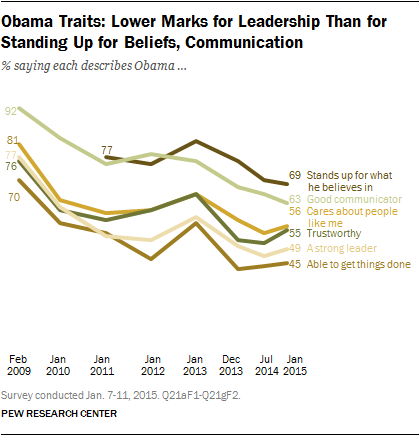
Evaluations of Obama’s personal characteristics are little changed over the course of the last year. Obama continues to be seen by clear majorities as someone who stands up for what he believes in (69% say this phrase reflects their impression of him) and as a good communicator (63%).
Somewhat fewer view Obama as someone who cares about people like them (56%) or as trustworthy (55%). Obama gets his lowest ratings for leadership and effectiveness. About half (49%) say Obama is a strong leader; an identical percentage (49%) says he is not a strong leader. And while 45% say he is able to get things done, 50% disagree.
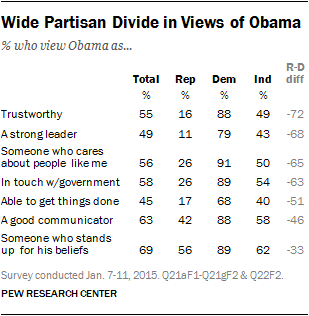
Although these impressions are on par with public views of Obama in December 2013 and July 2014, Obama was viewed far more positively on all of these traits earlier in his presidency.
As in the past, partisans differ widely in their impressions of Obama. Some of the largest gaps are in views of Obama’s trustworthiness and leadership: 88% of Democrats say Obama is trustworthy, compared with just 16% of Republicans. And while 79% of Democrats think Obama is a strong leader, just 11% of Republicans think so.
Obama is viewed positively by Republicans on just one of the seven traits asked about — standing up for his beliefs; 56% of Republicans say this description applies to Obama (89% of Democrats say this). About six-in ten independents (62%) also view Obama as standing up for what he believes in, and a similar number (58%) say the president is a good communicator. He gets lower marks from independents on leadership and efficacy: 43% view him as a strong leader, while 40% say he is able to get things done.
More See Obama as ‘Liberal’ than ‘Middle of the Road,’ ‘Conservative’
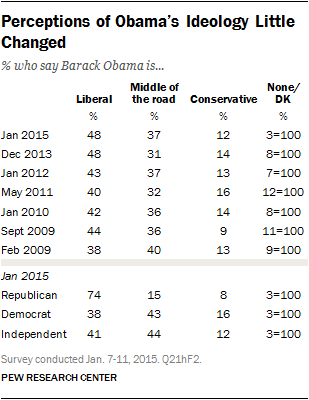
Overall, about half (48%) of Americans say that Obama is liberal, while 37% say he is ‘middle of the road’ ideologically; just 12% describe him as conservative. The balance of opinion in these perceptions has changed little over the last several years.
Partisans see the president’s ideological positioning very differently. Nearly three-quarters of Republicans (74%) say that Obama is liberal. By contrast, only about half as many Democrats (38%) describe Obama as liberal, while 43% say that he is middle of the road; 16% of Democrats view Obama as a conservative. Among Democrats, 56% of liberal Democrats say Obama is a liberal, while 36% say he is middle of the road. Among conservative and moderate Democrats, just 25% say he is liberal and 49% see Obama as middle of the road.
Independents’ views of Obama are similar to those of Democrats: 41% say he is liberal and 44% say he is middle of the road, while just 12% say he is conservative.
Obama’s Impact on the Economy
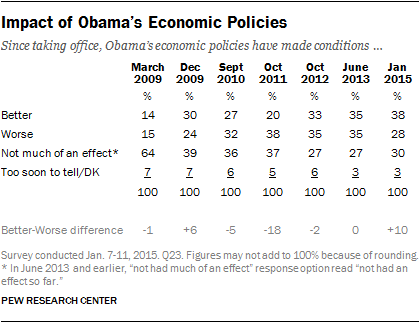
Nearly four-in-ten (38%) say Obama’s economic policies since taking office have made economic conditions better, while 28% say they have made the economy worse; three-in-ten (30%) think they have not had much of an effect. On balance, this is the most positive rating of Obama’s economic impact since December 2009.
Democrats overwhelmingly give Obama’s policies credit for improving economic conditions: 64% say they have made the economy better, 5% say they have made it worse, and 27% say they have not had much of an effect. Republicans largely say Obama’s policies have worsened economic conditions (57%), with 10% saying they have improved the economy and 31% saying they have not had much of an effect. Among independents, 36% say Obama’s policies have made the economy better, 31% worse, and 32% say the policies have not had much of an effect.
The public’s opinions about the issue have improved since a slightly different version of this question was last asked in June 2013, when as many said Obama’s policies had made the country’s economic conditions better as worse (35% each); in that survey, 27% said his policies had not had an effect so far. The change since then is largely due to improving views among independents since 2013, when a greater share said Obama’s policies had made the economy worse (43%) than better (26%).
Obama’s Approach to Foreign Policy
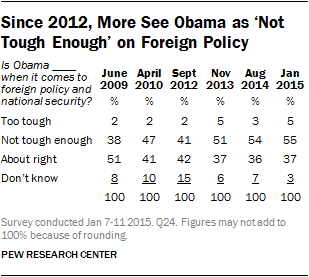
Since 2012, there has been a sharp increase in the share of Americans who say Obama’s approach to foreign policy and national security issues is ‘not tough enough.’ In September of that year, during the presidential campaign, 41% said Obama was not tough enough, while about as many (42%) said his approach was about right.
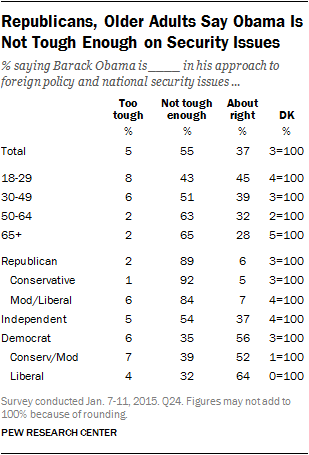
In November 2013, 51% said Obama was not tough enough, up 10 points from a year earlier. And in two polls since then, including the current survey (55%), the share saying Obama is not tough enough has surpassed 50%.
About nine-in-ten Republicans (89%) say Obama is not tough enough in dealing with foreign policy and national security. While this has been the majority view among Republicans throughout Obama’s presidency, the share saying this is greater than in the past (77% said this in August).
A 56% majority of Democrats say Obama’s approach is about right, but this view is more prevalent among liberal Democrats (64% say this) than among conservatives and moderates in the party (52%).
Independent views largely mirror those of the overall public: 54% say Obama is not tough enough, while 37% think his approach is about right and just 5% say he is too tough.
There is also a substantial age divide in these views of Obama’s approach to foreign policy: Those younger than 30 are divided on the question: 45% say his approach is about right, while 43% say he is not tough enough. Older Americans — particularly those 50 and older — are more likely to say Obama’s foreign policy stance is not tough enough
Views of Obama’s Legacy

Heading into his seventh year in office, public views of how Obama’s presidency will be seen in the long run are divided: 32% say he’ll be a successful president, 38% say he’ll be unsuccessful, while 29% say it is too early to tell. These public prognostications are similar to views last January.
Predictions about the long-term success of Obama’s presidency have fluctuated somewhat since he took office. On the eve of his inauguration in January 2009, 30% said he would be successful while just 4% disagreed; 65% said it was too early to tell. Since then, opinions have been more evenly divided.
Compared with prospects for success at a comparable point in their presidencies, Obama fares better than his immediate predecessor George W. Bush, but not as well as Bill Clinton.
Though Bush garnered positive ratings on this measure early in his presidency, in January of 2007 just 24% of Americans thought he would be a successful president, while nearly twice as many (45%) said he would be unsuccessful. By contrast, Clinton’s ratings on this measure were far better later in his presidency than earlier, and in January 1999 his ratings were the inverse of Bush’s:44% said he would be successful, while just 24% said he would be unsuccessful.
A similar pattern is seen in views of the administration’s accomplishments and failures; today the public is divided: 44% say the Obama administration’s accomplishments will outweigh its failures, while 50% say its failures will outweigh its accomplishments. In January 2007, the balance of opinion in this evaluation of the Bush administration was negative (53% failures outweigh accomplishments, 31% accomplishments outweigh failures), while in January 1999 the balance of opinion in views of the Clinton administration was positive (50% accomplishments outweigh failures, 34% failures outweigh accomplishments).